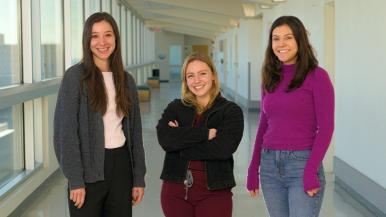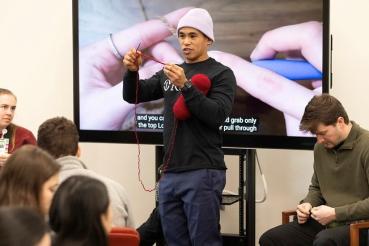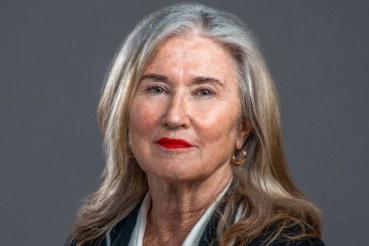You don’t necessarily need a zen meditation room to experience life-changing wellness insight. A busy parking lot can be enough.
Julia Harbison, a second-year RUSH Medical College student and co-president of the RUSH University Student Wellness Association (RU Well), was on her way to her car when a fellow student shared an “aha!” moment. The student thanked Harbison for an RU Well yoga session they just completed and told her she didn’t realize just how much her body and mind needed a break.
“It’s so nice to see students reflecting on the opportunities provided by RU Well,” says Harbison, who is a co-president of the student-run organization. “Taking time for yourself never hurts, so it’s nice to hear that students are really grateful to have a break.”
Harbison, second-year RUSH Medical College student Sam Levin and second-year occupational therapy student Chloe Maciolek lead the student-run RU Well group, which promotes student well-being. They recently talked about the group, the importance of wellness and some of their favorite stress-reduction tools.
Describe the RU Well program.
Julia Harbison: The program promotes wellness among students. It could be physical wellness, emotional wellness or social wellness. Part of our goal is to build a community so we can support one another.
Sam Levin: In the past, it has been run primarily by students at RUSH Medical College, but one of our goals is to branch out to other colleges at RUSH. With Chloe on board, we have started to get a lot of participation from occupational therapy students. Going into 2023, we hope to bring even more programs into the mix.
Chloe Maciolek: And we usually have a mix of different students who attend. We hold different types of events, so it always depends on scheduling and personal preference. Some people prefer more active sessions like yoga while others prefer to listen to a speakers.
What sparked your interest in wellness?
Julia Harbison: As an undergraduate at the University of Michigan — with Sam as a classmate — I did not prioritize my wellness at all. As long as I got my schoolwork done, I wasn’t focused on sleep. I wasn’t worried about what I ate. I love working out, but I would only allow myself to do it once or twice a week —if I got schoolwork done.
I'm grateful I worked so hard back then because it got me to where I am now, but I knew I had to completely rebuild my lifestyle as I started medical school. I needed to place my physical, mental and social wellness above anything else. I'm still getting good grades like I did as an undergraduate, but now my quality of life is so much better. You can't pour from an empty cup. Health care is a very giving profession, so you need to take care of yourself before you can take care of your patients.
Sam Levin: As a junior in college, I really struggled with wellness. I was focusing on biochemistry, and it became my whole life. I found that focusing on other aspects of my life made me an even better student — made me even stronger and happier. Learning that as an undergraduate student has helped me a lot in medical school.
I want to continue learning about wellness from other people through RU Well while also sharing what I've learned with other students.
Chloe Maciolek: I went to the University of Chicago as an undergraduate and felt overwhelmed all the time. I was trying to stay afloat. Eventually I got to a breaking point and was burned out. That gave me a chance to reevaluate my life.
At RUSH, Dr. Hahn took me under her wing. She does a lot of research related to wellness and resilience-building in the occupational therapy profession, so I jumped on one of her research projects in my first term. I have been working with her and that team of researchers ever since. That has really built my just love for wellness and appreciation for how important resilience is for health care providers.
How important is it for future health care providers to learn wellness skills?
Chloe Maciolek: your wellness at the forefront allows you to be present and at your best when treating patients. And wellness and well-being help clinicians build resilience, which decreases burnout and allows for a long career. Resiliency is not easy to build, but it allows you to learn, grow and come back from tough moments.
Julia Harbison: And while we're learning wellness tools for ourselves, those same tools can be applied toward our patients. We can suggest wellness tools in certain circumstances rather than moving too quickly to something like surgery or medication. The more we learn about our own wellness, the more we can cater treatment plans that set patients up for success.
What are some of your favorite wellness tools?
Julia Harbison: I find that focusing on physical fitness impacts every other aspect of my day. Weightlifting and going on walks help boost my mental health and productivity. Another big thing for me is getting enough sleep. I try to get eight hours of sleep per night. That has really benefited my ability to function day-to-day.
Sam Levin: Two things for me. One is having something really good to eat every day, whether it’s at the beginning of the day or something to look forward to at the end of the day. That really makes me excited, and it gets me through my day. Also, at the beginning of each week I try to schedule my social activities. Am I seeing any friends or family? Those relationships help me remember that my life isn't just about studying. There are a lot of other things in my life that I look forward to. Keeping those in mind helps me get through the really hard times.
Chloe Maciolek: Like Julia, I'm very much a move-my-body kind of person. I like to do something active every day, even if it’s just 30 minutes. I’ll go for a walk or a run. And I have tried to carve out my lunch as just a lunch break instead of a time when I continue to work. It’s hard for me to be productive all day long without at least a 30-minute break. Giving myself that lunch break as a time to just eat my lunch is crucial for me.
It seems students who are especially stressed and might benefit from RU Well the most might feel overwhelmed thinking about how to fit one more thing into their schedules. What advice would you give them?
Julia Harbison: Yes, the people we want to reach the most are the hardest to get our message to. I would tell them to start with, maybe, a five-minute break. Come to our event for five minutes. Grab a bagel. Come say hi. Just do that for yourself. It's literally just walking down the hallway. It’s essentially a bathroom break. You don't have to carve out six hours of your day for wellness. The hardest part is getting students to our events, because once they actually go, they want to stay. They realize this is a refreshing break and a way to build community and feel supported. You realize other students are going through something very similar.
Chloe Maciolek: And a lot of the events are planned in advance. That helps you fit them into your schedule. It’s important to prioritize doing something for yourself. At the end of the day, what's more important than your well-being? It is such a crucial piece to being a functioning, productive clinician who is able to help others. You need to be at your best, so give yourself a moment to have some meaningful interaction. It’s well worth your time.
Sam Levin: If you feel too stressed to attend in that moment, make sure that you tell yourself, “OK, I can't go today, but in three days I'm going to do something else for myself.” Be purposeful about devoting time to yourself. If attending an event is going to stress you out, we don’t want that either. Just remind yourself you can schedule time for yourself later on.




